How To Run A Profitable Business & Make Money
Last updated: Jun 19, 2023
The video by The Futur is about the difference between cost, price, and value in running a profitable business and how charging only the cost of a product or service may not lead to making a profit.
The video is a whiteboard session discussing the difference between cost, price, and value in running a profitable business.
The speaker explains that cost is the amount incurred on inputs such as raw materials, salaries, rent, interest, taxes, and duties for producing any product or service.
He emphasizes that charging only the cost to clients will only break even and not account for other expenses such as equipment and rent.
The speaker also mentions an upcoming business boot camp and encourages viewers to support the channel through Venmo instead of Super Chat.
- The video discusses cost, price, and value in running a profitable business.
- Charging only the cost of a product or service may not lead to making a profit.
- Announcement of Business Boot Camp, a $5000 program, with details on how to save money by being an early bird.
- Understanding the difference between cost, price, and value is crucial for running a profitable business.
- Charging for value means considering all expenses and adding a profit margin.
- Profit is necessary to invest in new equipment and meet the standards of clients.
- Adding value to a product or service can increase its perceived worth to the customer.
- Risk is a factor that determines the amount of profit in a business.
- Profit can be dramatically different depending on the level of risk in a business.
How To Run A Profitable Business & Make Money - YouTube

Introduction and Business Boot Camp Announcement
- Video is about cost, price, and value in running a profitable business
- Charging only the cost of a product or service may not lead to making a profit
- Announcement of Business Boot Camp, a $5000 program
- Details on how to save money by being an early bird
- Recording new modules for the program and increasing the price in the future

The Difference Between Cost, Price, and Value
- People use cost and price interchangeably, but they mean different things
- Cost is the amount incurred on the inputs for producing any product or service
- Cost is measured in time, effort, materials, salaries, rent, interest, taxes, duties, etc.
- Price is what people pay for a product or service
- Value is the perceived benefit or worth of a product or service to the customer

The Importance of Charging for Value, Not Just Cost
- Charging only the cost of a product or service may not lead to making a profit
- Not accounting for all expenses can lead to running at near break-even or even losing money
- Charging for value means considering all expenses and adding a profit margin
- Charging for value also means considering the perceived benefit or worth of the product or service to the customer
- Charging for value can lead to making a profit and growing the business
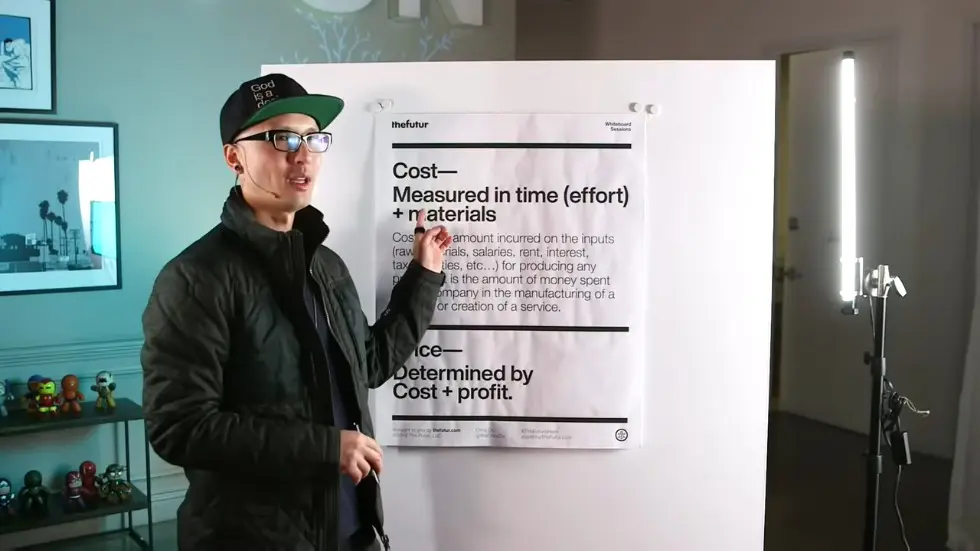
How To Run A Profitable Business & Make Money - YouTube
Conclusion and Call to Action
- Understanding the difference between cost, price, and value is crucial for running a profitable business
- Charging for value, not just cost, can lead to making a profit and growing the business
- Announcement of the Business Boot Camp again and the importance of investing in education and training
- Call to action to find Chris Doe on Venmo to support the cause and stay tuned for more content

Cost vs Price vs Value
- Charging only the cost of a product or service may not lead to making a profit.
- Cost is what it costs you to make something, but it doesn't account for any mistakes, delays, or mishaps.
- Price is what it costs you to make plus profit.
- Value is not just the labor it takes to make something, but also the profit that is included in the price.
- Profit is rather arbitrary and is implied in the price.

The Rule of Profit
- When a client asks for the cost, they are asking for the price of doing something with you.
- Profit should be included in the price, but how much profit is arbitrary.
- When calculating the price, consider your time, other labor, and any expenses such as gear rentals.
- Find an industry standard for gear rental rates and include that in your estimate.
- Charging for gear is not dishonest, it is the cost of doing business.

The Importance of Profit
- Not including profit in the price means that you are only paying yourself for the job.
- Recuperating the cost of gear is important because it has a shelf life and goes down in value over time.
- Not including profit means that you are not making any money from the job.
- Profit is necessary to invest in new equipment and meet the standards of clients.
- Profit is the difference between the cost and the price, and it is what makes a business profitable.

Conclusion
- Charging only the cost of a product or service is not enough to make a profit.
- Profit should be included in the price, but how much profit is arbitrary.
- Recuperating the cost of gear and including profit in the price is necessary for a profitable business.
- Profit is the difference between the cost and the price, and it is what makes a business profitable.
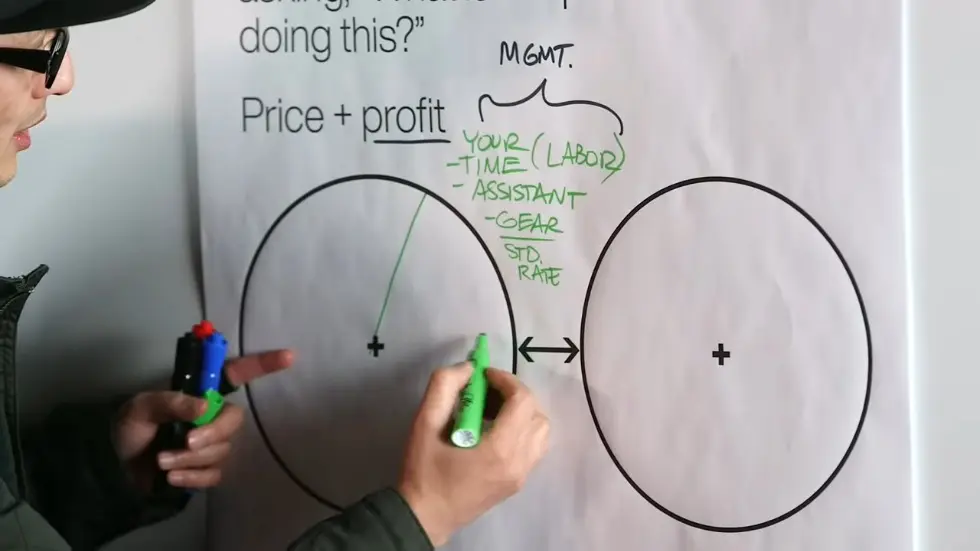
Understanding Profit in Business
- Managing a business involves accounting for administrative time and labor costs.
- Profit is the amount left in the checking account after paying expenses and labor costs.
- Adding profit to estimates is necessary for running a profitable business.
- A reasonable profit amount to add can range from 5% to 25%.
- Profit can be dramatically different depending on the business and its profit margin.

The Difference Between Cost, Price, and Value
- Cost is what it costs to make a product or provide a service.
- Price is what the customer pays for the product or service.
- Value is the perceived worth of the product or service to the customer.
- Marking up a project can result in charging more than what it cost to make.
- Profit can be dramatically different depending on the business and its profit margin.

The Importance of Adding Value to Your Business
- Adding value to a product or service can increase its perceived worth to the customer.
- Providing excellent customer service can add value to a business.
- Understanding customer needs and wants is crucial for adding value to a business.
- Adding value can result in charging more for a product or service.
- Adding value can lead to customer loyalty and repeat business.

The Role of Risk in Profit
- Risk is a factor that determines the amount of profit in a business.
- Higher risk can result in higher profit margins.
- Lower risk can result in lower profit margins.
- Understanding and managing risk is crucial for running a profitable business.
- Profit can be dramatically different depending on the level of risk in a business.
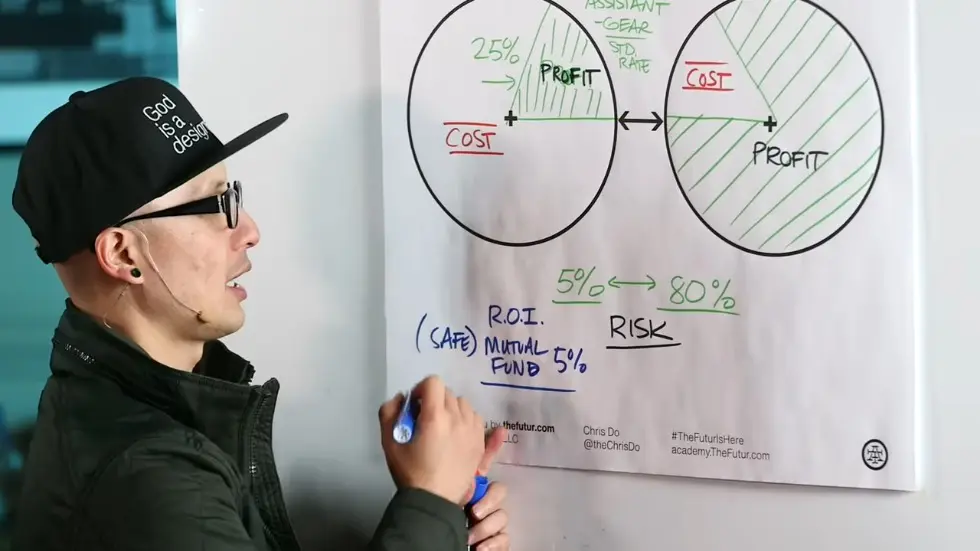
Risk and Return on Investment
- Investing in safe options like mutual funds promises a lower return on investment (ROI).
- Investing in volatile options like tech stocks promises a higher ROI.
- High risk equals high reward, while low risk equals low reward.
- Profit is determined by who is willing to take the risk.
- Entrepreneurship involves assuming risk.

Cost, Price, and Value
- Clients may ask for a fixed fee for a project, which is the price.
- Price is determined by the seller, but the buyer determines the value.
- Value is subjective and dependent on the buyer.
- The seller's first touch point determines the price.
- Profit is determined by adding value to the cost and price.

Adding Profit to the Equation
- Assuming risk adds profit to the cost and price.
- Unknown unknowns can increase the risk and therefore the profit.
- Entrepreneurship involves adding profit to the cost and price to accommodate risk.
- Profit is determined by adding value to the cost and price.
- Profit is necessary for a business to be sustainable and profitable.

The Importance of Value
- Value is subjective and dependent on the buyer.
- Value can be added to a product or service through marketing and branding.
- Value can be increased by understanding the buyer's needs and desires.
- Value is necessary for a business to be successful and profitable.
- Profit is determined by adding value to the cost and price.

Determining Price and Value
- Pricing a product too low may not lead to profit.
- Sometimes increasing the price can lead to selling more products.
- The seller determines the price, but the buyer determines the value.
- The buyer decides if the price is fair based on their needs and wants.
- If the buyer perceives more value than the price, they will buy the product.

Setting Prices Too High
- Some creative people think that setting prices too high takes advantage of the buyer.
- However, the buyer decides if the product is valuable to them.
- If the buyer doesn't see value in the product, they won't buy it.
- For example, some people may not see the value in expensive cars or diamonds.
- When value exceeds price, buyers will give you money.

Buyer Determines Value
- The buyer always determines the value of a product.
- The seller determines the price, but the buyer decides if it's fair.
- If the buyer perceives more value than the price, they will buy the product.
- There cannot be such a thing as setting a value for a product.
- The buyer always has the choice to not buy the product if they don't see value in it.

Examples of Value and Price
- The value of a product is subjective and varies from person to person.
- For example, some people may see the value in expensive cars or diamonds, while others may not.
- The buyer decides if the price is fair based on their perception of value.
- If the buyer perceives more value than the price, they will buy the product.
- When value exceeds price, buyers will give you money.

Keystoning and the Double Keystone Model
- Keystoning is a pricing strategy where the price of a product is doubled from its cost.
- The double keystone model involves the manufacturer, retailer, and customer.
- The manufacturer sells the product to the retailer for a price that allows them to make a 50% profit.
- The retailer then adds their profit and sells the product to the customer for double the price they bought it for.
- The manufacturer needs to keep the cost of the product below 50% of the selling price to make a profit.

The Disconnect Between Price and Cost
- The price of a product includes profit, which is not the same as the cost of the product.
- Manufacturers are starting to sell directly to customers through platforms like Kickstarter.
- Direct sales benefit both the manufacturer and the customer by cutting out the middle person.
- By selling directly to customers, manufacturers can offer lower prices while still making a profit.
- Direct sales also allow manufacturers to have a closer relationship with their customers.
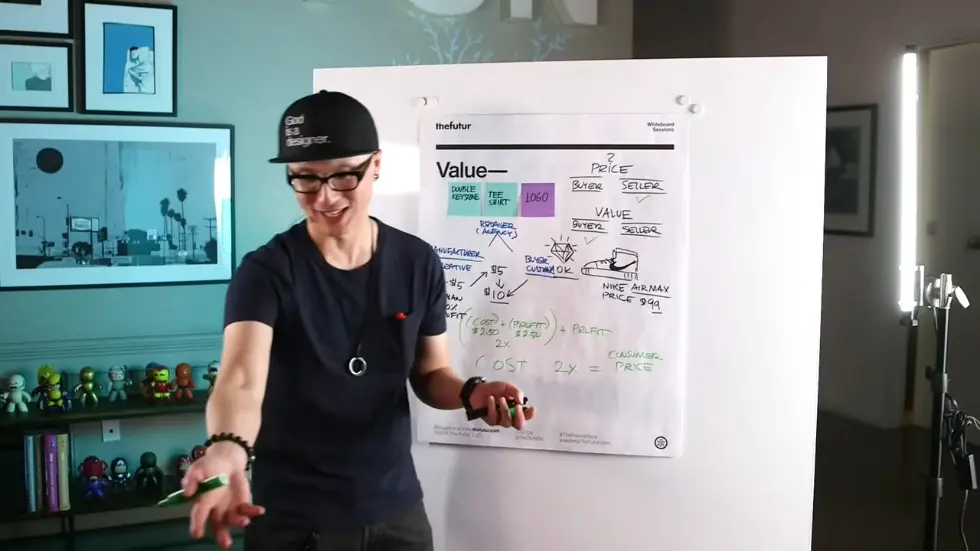
The Importance of Understanding Basic Business Concepts
- Understanding basic business concepts can help you make more money and sound more credible when speaking to clients.
- It allows you to have a real conversation with clients about their business and how your services can benefit them.
- Basic business concepts include cost, price, and value.
- By understanding these concepts, you can make informed decisions about pricing and profitability.
- It also helps you understand the supply chain and how different players in the chain make a profit.
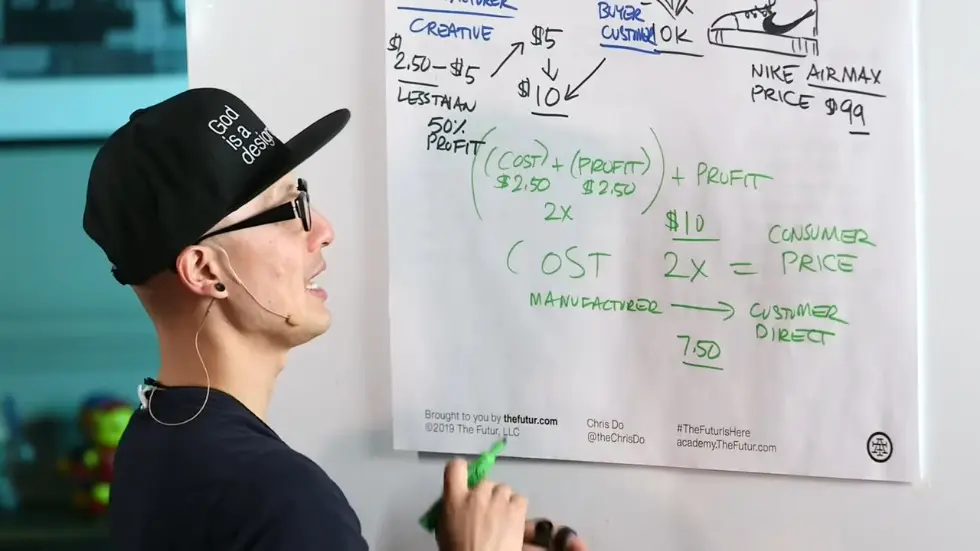
The Benefits of Direct Sales
- Direct sales allow manufacturers to sell products directly to customers, cutting out the middle person.
- This benefits both the manufacturer and the customer by offering lower prices and a closer relationship.
- Direct sales also allow manufacturers to have more control over their brand and product.
- Platforms like Kickstarter make it easier for manufacturers to sell directly to customers.
- Direct sales can also help manufacturers test the market and get feedback on their product.

The Double Keystone Model
- Charging double the cost of a product or service can lead to increased profits.
- This is known as the double keystone model.
- It involves marking up the cost twice before selling to the customer.
- This model can be applied to physical products as well as creative services.
- By using this model, businesses can save money and increase profits.

The Middle Buyer Model
- When a bigger agency or studio needs subcontractors, they hire out people and determine costs together.
- They then sell the product or service to the end customer.
- If you can sidestep the middle person and sell directly to the customer, you will make more money.
- Working with sites like Fiverr, Upwork, or Freelancer often involves a middle person brokering the deal and taking a cut of the profits.
- Learning about branding, marketing, customer service, and sales can help you sidestep the middle person and increase profits.
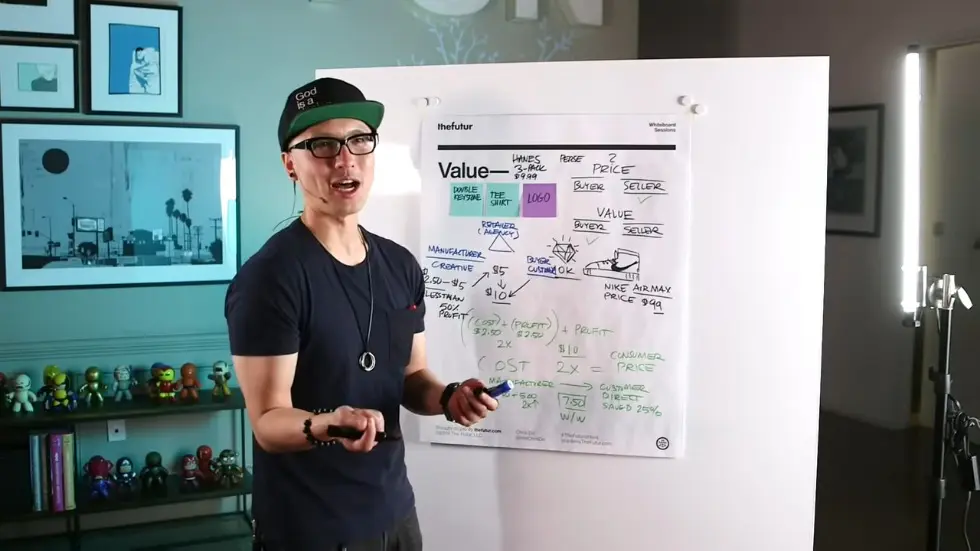
The Value of Premium Products and Branding
- Two t-shirts can be objectively the same but subjectively command very different prices.
- Buyers place more value on premium products and branding.
- Using premium materials and branding can increase the perceived value of a product or service.
- James Perse t-shirts, for example, can cost up to $135 because of their premium materials and branding.
- By using premium materials and branding, businesses can increase profits by charging more for their products or services.

Setting Income Goals
- By applying the principles discussed in the video, it is possible to double your income for the next year.
- Setting income goals can help motivate you to apply these principles.
- For example, setting a goal to double your income from the previous year can help you focus on increasing profits.
- Learning about branding, marketing, customer service, and sales can help you achieve your income goals.
- Donations to the creator's Venmo account are accepted but not required.

Cost, Price, and Value
- Charging only the cost of a product or service may not lead to making a profit.
- The buyer determines the value of a product or service.
- People assign different values to things based on their emotional attachment.
- Technical differences exist, but emotional drivers are the biggest factor in determining value.
- Businesses need to understand the value that their product or service provides to the buyer.

The Value of a Logo
- The value of a logo is determined by the buyer.
- Two buyers may assign different values to the same logo.
- Businesses need to understand the value that their logo provides to the buyer.
- There are techniques to negotiate and talk about value, but you cannot invent value in the buyer's mind.
- By asking questions and doing discovery, businesses can help buyers realize the value in their mind.

The Importance of Understanding Value
- Businesses need to understand the value that their product or service provides to the buyer.
- Understanding value helps businesses set prices that lead to making a profit.
- Businesses cannot convince buyers that a product or service is worth more than they believe it is.
- By helping buyers understand the value of a product or service, businesses can increase the price that buyers are willing to pay.
- Businesses need to focus on solving the business problem that the buyer is trying to solve.

Negotiating Value
- There are techniques to negotiate and talk about value.
- Businesses can help buyers realize the value in their mind through discovery and asking questions.
- Businesses cannot invent value in the buyer's mind.
- By understanding the value that their product or service provides to the buyer, businesses can negotiate a higher price.
- Businesses need to focus on solving the business problem that the buyer is trying to solve.

Price Differences for Identical Products
- Identical products can have different prices depending on where they are purchased.
- Buying in bulk from a wholesale store like Costco is the cheapest option, but requires the most planning and effort.
- Vending machines offer convenience for spontaneous purchases, but cost more per serving.
- Movie theaters have a monopoly on concessions and charge the most per serving.
- Movie theaters may consider the movie itself a lost leader and make most of their money from concessions.

The Difference Between Cost, Price, and Value
- Cost is the amount of money it takes to produce a product or service.
- Price is the amount of money a customer pays for a product or service.
- Value is the perceived benefit a customer receives from a product or service.
- Charging only the cost of a product or service may not lead to making a profit.
- Businesses must consider the value they provide to customers when setting prices.

The Importance of Profit in Running a Business
- Profit is the amount of money a business makes after deducting expenses from revenue.
- Profit is necessary for a business to survive and grow.
- Businesses must consider all expenses, including overhead and labor costs, when setting prices.
- Businesses must also consider competition and market demand when setting prices.
- Businesses can increase profit by reducing expenses or increasing revenue.

The Role of Marketing in Creating Value
- Marketing is the process of creating value for customers and communicating that value to them.
- Marketing can help businesses differentiate themselves from competitors and create a unique brand identity.
- Marketing can also help businesses understand customer needs and preferences.
- Businesses must consider the cost of marketing when setting prices, but effective marketing can increase revenue and profit.
- Marketing should focus on creating value for customers, not just promoting products or services.

The Emotional Benefit of Pricing
- Consumers are conditioned to associate certain products with emotional benefits.
- Buying popcorn and soda at the movies triggers an emotional response and creates a bonding experience.
- Exclusive monopolies can charge higher prices because they trigger feelings of success and empowerment in consumers.
- Understanding a customer's pain point and marketing towards their emotions can lead to higher profits.
- Raw emotions that drive consumers include status and the desire for greater social status.

The Difference Between Cost, Price, and Value
- Cost is the amount of money it takes to produce a product or service.
- Price is the amount of money a customer pays for a product or service.
- Value is the emotional benefit a customer receives from a product or service.
- Charging only the cost of a product or service may not lead to making a profit.
- Understanding the emotional benefit of pricing can lead to higher profits.

Increasing the Price of a Product or Service
- Attaching an emotion to a product or service can increase its perceived value.
- Understanding what customers value most can help increase the price of a product or service.
- Exclusive monopolies can charge higher prices because they have no competition.
- Triggering emotional responses in customers can lead to higher profits.
- Understanding a customer's pain point and marketing towards their emotions can lead to higher profits.

The Importance of Understanding a Customer's Pain Point
- Understanding a customer's pain point can help businesses market towards their emotions.
- Most customers are not buying a product or service, but rather the emotional benefit it provides.
- Customers want to feel like they are successful and have greater social status.
- Helping customers feel this way can lead to higher profits.
- Understanding a customer's pain point is crucial for making a profit.

Difference between Cost, Price, and Value
- Cost is the sum total of what it costs to make something, without including profit.
- Price is the amount of money charged for a product or service, which includes profit and depends on factors such as risk and understanding of customer value.
- Understanding what is valuable to the customer is crucial in setting the right price.
- It's important to focus on big and important problems that will have a material impact on the customer's business.
- Business Boot Camp teaches these concepts to entrepreneurs and solopreneurs who want to grow their business.
- Warren Buffet famously said, "Price is what you pay, value is what you get."
Watch the video on YouTube:
How To Run A Profitable Business & Make Money - YouTube
Related summaries of videos:
